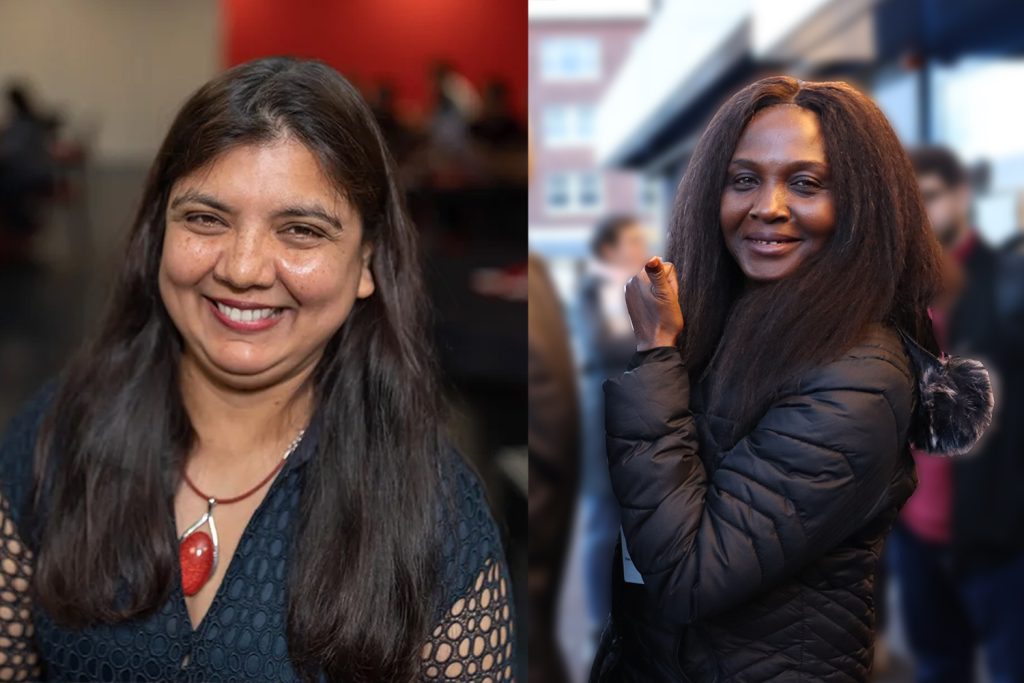In celebration of International Women’s Day on March 8th, a day about inclusion, equity, and diversity, we aim to celebrate women’s achievements, raise awareness about discrimination, and take action to drive gender parity, we want to share with you the passionate efforts of two Hague Academy alumni, each head of their own foundations, who work tirelessly on making gender equality a reality. We spoke to Zinthiya Ganeshpanchan and Foluke Ademokun, who followed our Gender Responsive Governance course in 2022.

Left: Zinthiya Ganeshpachan. Right: Foluke Ademookun.
Breaking the Silence
Zinthiya Ganeshpanchan is the founder and CEO of the Zinthiya Trust, a charity that helps women and families be free from poverty and abuse in Leicester. With strong Sri Lankan roots, Zinthiya’s foundation operates in both Sri Lanka and the United Kingdom.
Sri Lanka has a high rate of violence against women, in particular with cases of domestic abuse. Cases of gender-based violence increase during ethnic conflict and civil unrest. “Unfortunately, there are no accurate numbers due partly to the challenges in reporting, but also due to the understanding of what constitutes abuse”.
While there is no conflict-related abuse in the UK, and with several laws that prohibit violence against women and girls in place, one might think that the UK is much more progressive when it comes to gender-based violence (GBV). But, as Zinthiya highlights through her experience of running the Zinthiya Trust for the past 14 years, many women face abuse and suffering in silence.
“This was also one reason for me to set up the charity. Having worked in the field for so long, a constant challenge we are facing is the reluctance of women to come forward to report abuse”.
Continued Support
As an organisation, the Zinthiya Trust provides practical support to women and girls fleeing abuse. It does this to make sure that women who come forward to report abuse are given the support they need. If not, they will lose trust in the system and will feel more helpless. However, the Trust also prioritises raising awareness on the impact of violence against women and girls, as well as training other frontline organisations to upskill them to do what they can to help more women.
“I believe despite the many challenges faced by both countries, there is much work being done to prevent gender-based violence, especially by women in the sector. Therefore, I am optimistic. However, I am under no illusion that we will see a violence-free society in 10 years. It will take longer but one day we will all see the fruits of our labour”.
Although rooted in inherently different contexts, women in both the United Kingdom and Sri Lanka can seek help given that they are aware of the support available to them.
A Legal Framework for Addressing GBV in Nigeria
Foluke Ademokun is the Executive Coordinator at the Ajoke Ayisat Afolabi Foundation (AAAF) in Nigeria. The Foundation was established in 2008 by Dr Taiwo Afolabi and his siblings in memory of their mother. Their mission was to tackle the harmful practices against widowed women they saw around them. This included abuse from male family members and socioeconomic exclusion. Widows were often unable to afford basic necessities, rent, or take care of their children’s education.
The AAAF was established in a context woefully hostile to single and widowed women. Still now, Nigerian women entirely economically dependent on their husbands find themselves in vulnerable positions after their husband’s passing. Seen as the property of their husbands, widows have been forced into abject poverty and abused by landlords, male neighbours, and even family members.
In the last decade, civil society organisations like the AAAF have fought tremendously to support widowed women through inclusion, awareness, and advocacy. In many ways, these organisations have made strides. Drawing from international legal conventions, Nigerian CSOs have built the legal structures to continue their mission forward. The Convention on the Elimination of All forms of Discrimination Against Women (CEDAW), for example, effected internationally in 1981, has now been codified in 35 of the 36 states of Nigeria.
Toward a Better Future
The AAAF works now to provide educational, health, and economic support for widowed women to regain autonomy and safety in their lives. For instance, the AAAF provides grants for vocational skills training, helping 300 female traders and farmers hone their skills since 2021.
Through an improved legal milieu and direct socio-economic intervention, Foluke highlights the positive changes she has seen in Nigeria over the last decade. However, a complete transformation is still on the table, and Foluke is eager to see the progress that was made socially and economically also be made politically: “I hope that in the next round of general elections, in 2027, the number of female representation will have increased significantly”.
While political will to address gender-based violence is increasing, Foluke notes that better political representation is one of the surest ways that women’s priorities are reflected in decision-making.
“We will be seeing a vibrant and more gender transformative Nigeria,” – at absolutely all levels of society and government.
Join our course!
Interested in gender-sensitive strategies and tools for gender analysis, mainstreaming gender and gender-responsive budgeting in policies and programmes at the local level? Make sure to join our Gender Responsive Governance course. The deadline is 13 October 2023 and the course takes place from 22 November to 5 December 2023.
Related courses
We offer a diversity of courses throughout the year. Here are several other courses you might like.

